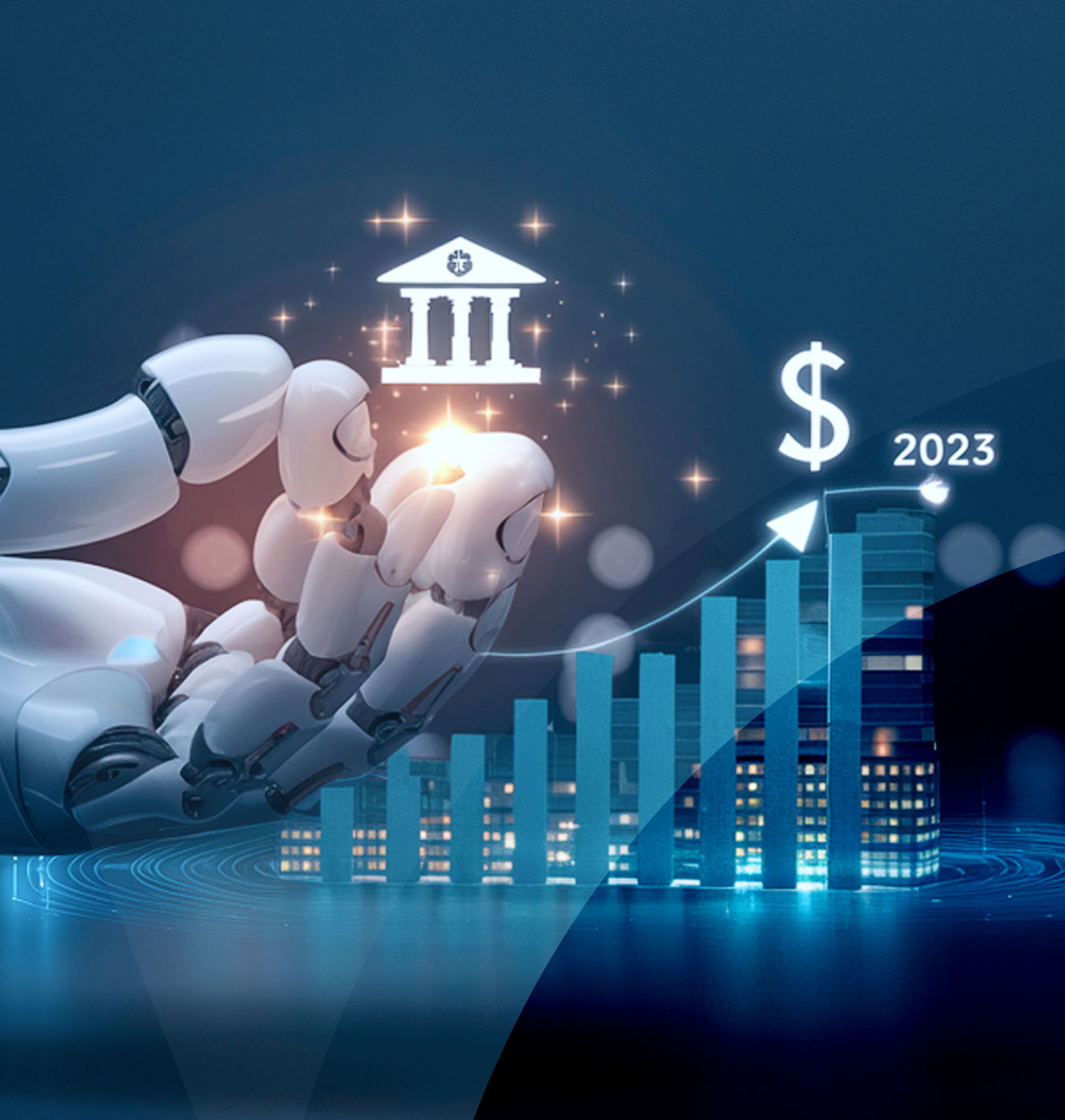Agentic AI Use Cases
BLOG
14 min read
Top 35 Agentic AI Use Cases with Real-World Applications Across Industries
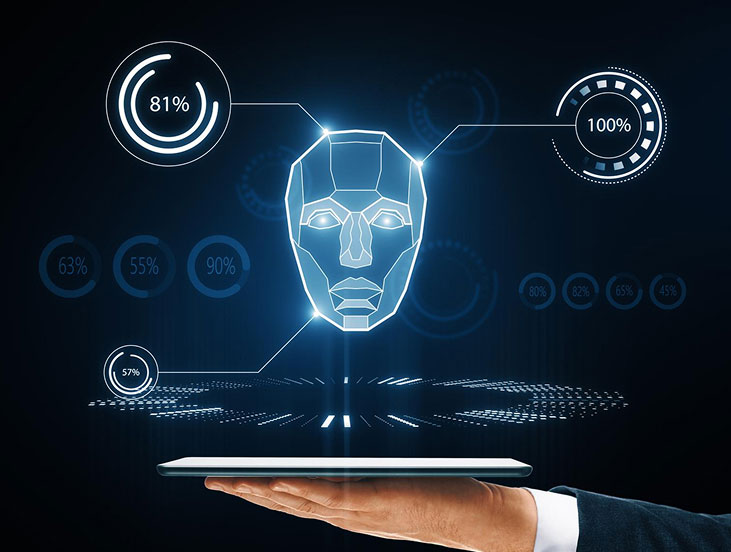
TURN USE CASES INTO RESULTS
WITH A LIVE AI AGENT IN JUST 5 WEEKS.
Show Me HowQuick Summary
Agentic AI use cases are different from RPA and other traditional automation. They play their actions autonomously, adapt, and achieve specific goals with less human intervention. The automation is not just limited to one area but spread across various fields, including Customer Experience (CX), sales and marketing, Human Resources (HR), healthcare, finance, and more. These AI agents can process orders, identify technical issues, nurture leads and complete many other tasks in diverse industries.
Agentic AI is bringing autonomy, adaptability, and real-time decision-making into the core of businesses. AI agents can now autonomously do complicated tasks, learn from past data, and continuously evolve their performance without human supervision in a variety of settings, including production floors and customer service desks.
This blog will highlight the top 35 agentic AI use cases with some real-world examples across industries like healthcare, finance, retail, logistics, and more. Explore how top business managers are making the best use of agentic AI.
Agentic AI Use Cases- Top 35 Examples
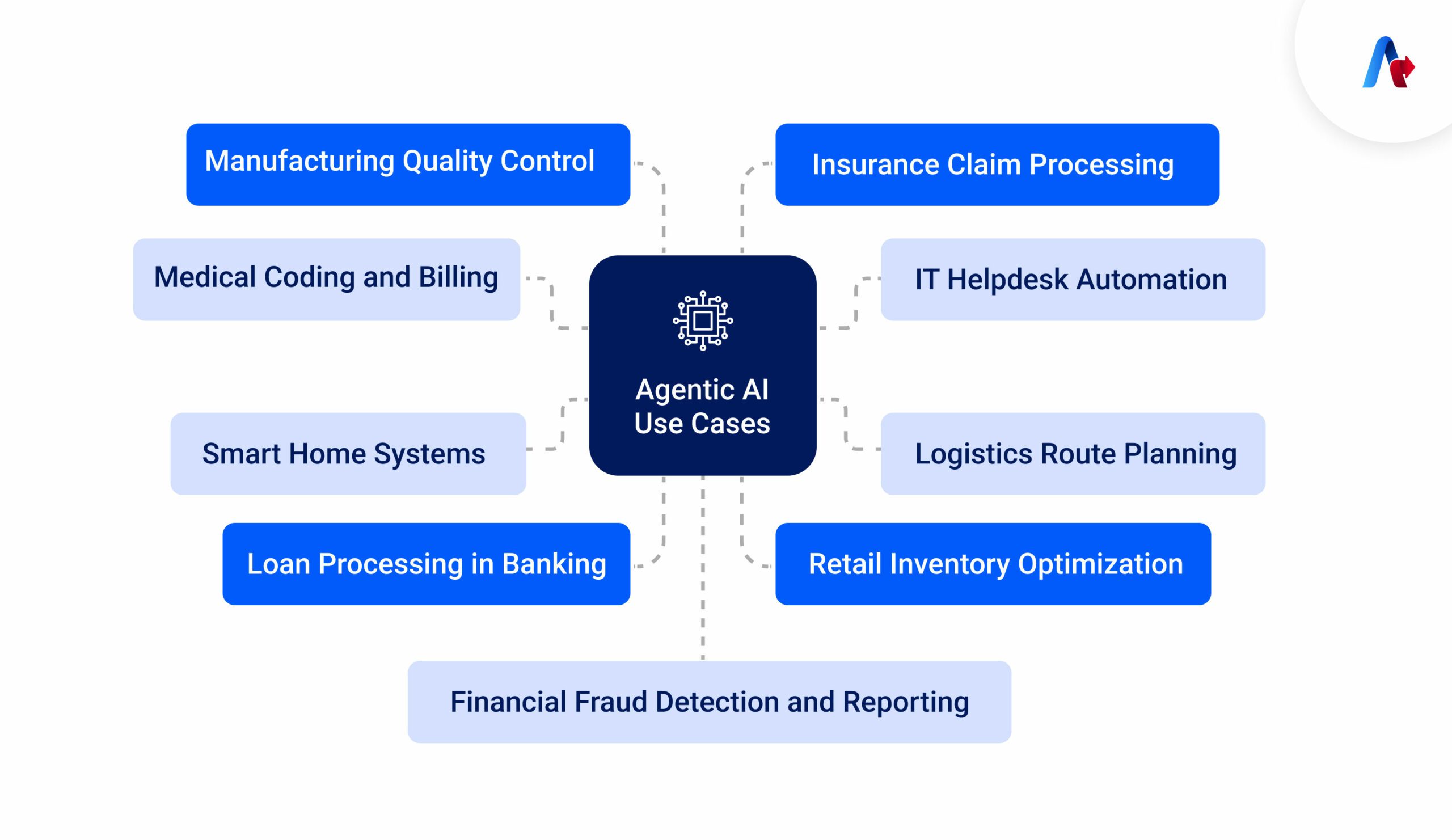
Discover how the autonomous decision-making skills of agentic AI have changed commercial operations. These 35 compelling application cases demonstrate its practical influence across several industries.
Agents in Customer Experience
Agentic AI in Customer Experience (CX) is an area where you can automate regular activities that need lots of attention. This intelligent can act independently, learn, and offer 24/7 support to your clients.
1. Customer Support Automation
Customer support is one of the areas that has gained many advantages from agentic AI. AI agents can independently handle complex customer inquiries and provide quick solutions without any human intervention.
A report by Gartner states that by 2029, AI will resolve 80% of common customer service issues with zero help from humans. It analyzes customer sentiments in real-time and provides tailored responses for better engagement.
One of its outstanding examples is visible in a telecom company named Elisa. It built a chatbot named Annika that has managed about 5,60,000 clients.
2. IT Helpdesk Automation
By independently identifying and fixing typical technical problems like software bugs, password resets, and network concerns, AI bots are changing IT assistance. These agents comprehend consumer enquiries, identify issues, and provide detailed answers in real time—often via chat interfaces or automated help desks—by utilizing Machine Learning (ML) and Natural Language Processing (NLP).
The use of AI assistance is useful to help minimize affected time and ensure customers can resume their tasks without having to wait for human assistance.
3. Content Moderation
To detect and handle content that breaches platform standards, such as hate speech, explicit content, misinformation, or harassment, agentic AI systems continuously monitor user-generated content. These systems analyze text, photos, and videos you use with the help of natural language processing and image recognition to identify offensive or dangerous information.
By using automated flagging, removing, or elevating dubious posts, they can assist platforms in upholding a polite and safe atmosphere while lowering their dependency on human moderators and guaranteeing quicker reaction times.
YouTube has implemented Generative AI into its platform to preserve user safety. They stress that all content must abide by the current Community Guidelines, regardless of its origin. They also aim to improve content management by using AI technologies to identify and handle policy infractions more efficiently.
AI agents do not stop with CX; they help in sales and marketing sections too.
Agentic AI for Sales & Marketing
Automating tasks, analyzing data, and delivering customized offers are not new in the market. The sales can be more effective when your firm has automation that can engage prospects and customize campaigns in real-time. The following agentic AI examples show you what it can do for a business.
4. Sales Outreach and Follow-Up
Another popular Agentic AI use case is its demand in sales outreach. AI Agent builds custom outreach communications, tracks responses, and follows up automatically to nurture leads. These agents prioritize prospects based on engagement levels to ensure timely follow-ups.
Once integrated with CRM, this helps keep sales pipelines updated and organized in real-time.
One great example of AI in B2B sales is that the LinkedIn sales navigator uses AI algorithms to recommend leads based on user activity and preferences.
5. Streamlined Marketing Campaigns
Agentic AI can handle each stage of marketing. Right from designing to launching and monitoring the campaign performance across various channels, it can handle it all. These agents analyze real-time data and adjust targeting, messaging, and timing to ensure maximum engagement and ROI with the least manual effort.
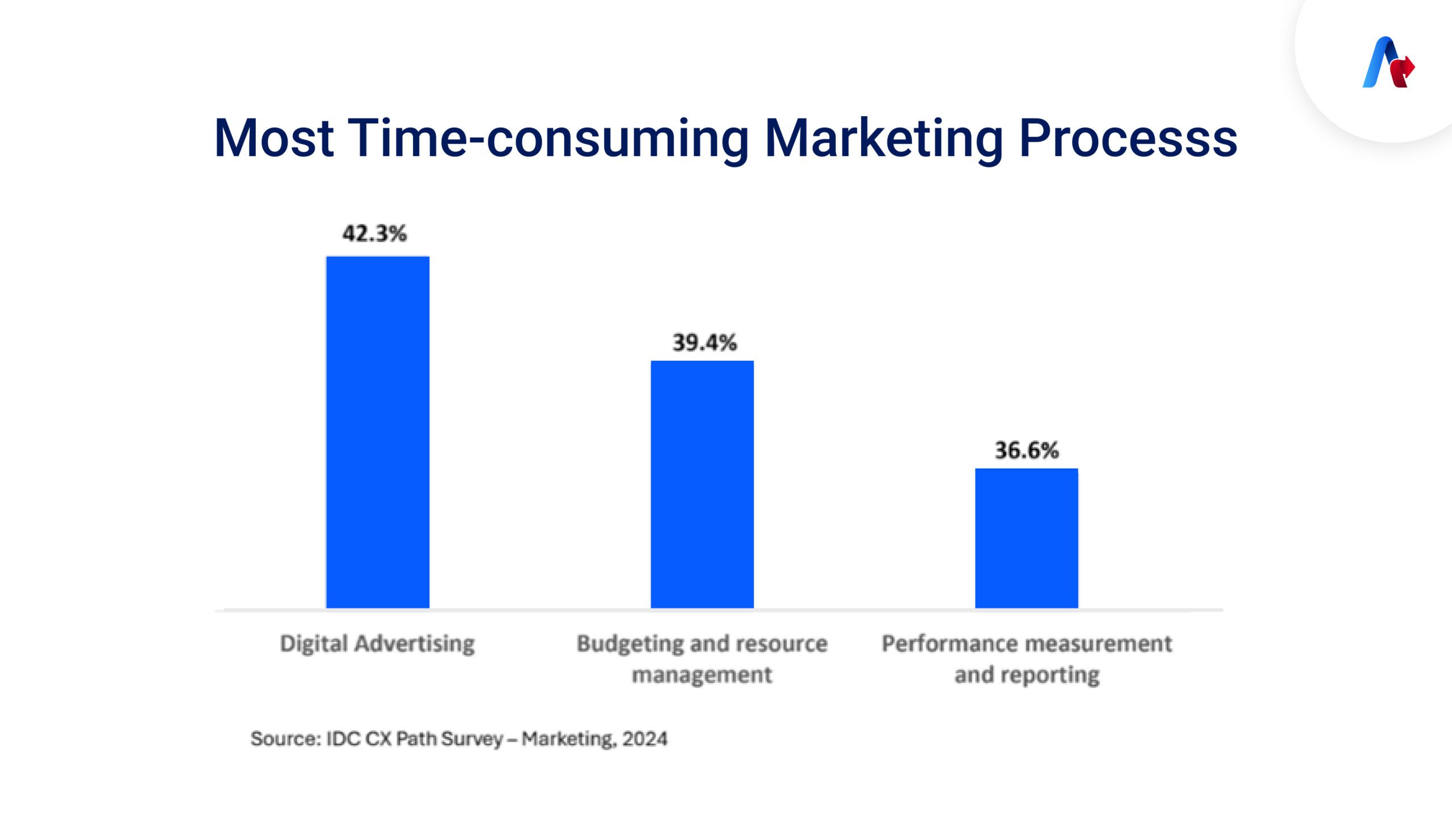
The image above shows some of the most time-consuming marketing processes which can be now easily handled by agentic AI.
6. Lead Prioritization & Nurturing
As an independent AI, automation understands customers' behavior, engagement patterns, and intent. Like before, the sales team does not need to follow everyone but can focus on high-potential customers with the help of this technology.
The sales agents predict the most essential customers, ensure consistent engagement, and free up your team's time for other valuable work. For instance, it can send product demos and remind customers to visit the pricing page without manual effort.
Now, we can explore how HR is using this technology to streamline their hiring, onboarding and employee engagement.
Agentic Automation in HR
An AI agent example in Human Resources (HR) is one of the most effective uses happening in the market. Several areas come under this process, including recruitment, HR policy enforcement and more. Some of the use cases are:
7. Recruitment Automation
Agentic AI automates key stages of recruitment by screening resumes based on predefined criteria, scheduling interviews with the right and qualified candidates, and engaging applicants via chat or email.
The whole process helps streamline hiring, reduces manual workload, and assists recruiters to focus on top talent faster and more efficiently.
8. HR Policy Enforcement
By verifying each regulation and legal requirement, AI agents improve the onboarding and offboarding experience of employees. While monitoring compliance checkpoints, these agents assist new hires with document submissions, policy acknowledgements, training plans, and system access configurations during the onboarding process.
They minimize manual oversight and guarantee uniformity across departments by automatically confirming that relevant approvals are received, security measures are followed, and required papers are filled out.
One popular agentic AI example in this industry is IBM. Its Watsonx assistant platform helps employees reduce their time spent on common HR tasks by 75%.
9. Employee Sentiment Analysis
Agentic AI HR use cases also include employees' sentiments at your organization. When you know what they think, it may help in different ways, such as reducing turnover, building a positive culture, and improving performance.
Knowing these can take a business to the next level and help to achieve its mission and vision. The intelligent agent you hire from a quality provider analyzes stress from the message, conversation and autonomously alerts HR in real-time, helping higher authorities to improve retention and satisfaction.
AI in healthcare will automate many tasks, such as document processing, scheduling appointments, and other daily, repetitive tasks. Let’s see how they are useful in this sector.
Agent Automation Use Cases in Healthcare
AI automation with agents solves many challenges in the healthcare industry and guides you with the next step with less effort. It assists hospitals in doing their mundane and repetitive tasks and researchers in fast screening and clinical trials. Some of the core agentic AI use cases in healthcare are:
10. Healthcare Appointment Scheduling
AI agents facilitate fast scheduling of medical appointments through the communication of patients, physicians, and health plans. Besides coverage and availability, they also attend to scheduling and rescheduling, as well as notifications about the same, making visits smooth and swift and keeping patients happy.
They offer patient history-based, context-aware scheduling by integrating with electronic health data.
With prompt notifications and astute follow-up choices, they also help in lowering no-show rates.
One of the notable agentic AI use cases in the healthcare industry is the Mayo Clinic. The Mayo Clinic uses AI-powered virtual assistants to give a better customer experience, improve patient interaction and expedite administrative duties. By easing conversations and offering health information, these AI agents help patients and enhance their overall experience.
11. Medical Coding and Billing
To correctly assign medical codes based on diagnoses, procedures, and treatments, AI agents evaluate clinical documentation in real time. Healthcare providers benefit from speedier reimbursements and increased operational efficiency because of this automation, which also guarantees coding standards compliance, lowers human error, and expedites the billing process.
Through constant learning from fresh data, they gradually increase the accuracy of their coding. They facilitate smooth data flow and lessen the administrative burden on medical staff by interfacing with EHR systems.
12. Clinical Trial
The clinical trial is a daunting job that involves lots of processes, such as data analysis, creating a consent form, case report form and more. When you have an ally like agentic AI, it automates many tasks at your workplace, helping with faster trials and matching.
For example, an AI can look at the review historical data and identify potential issues, helping you optimize the clinical protocol for an effective and efficient trial.
These scenarios show how powerful automation can transform patients and health care. If you are looking for AI agents examples that are effectively working in the medical sector, these use cases can satisfy you.
In the following section, let’s find out how financial institutions are using AI agent solutions to improve their speed, fraud detection and efficiency.
Agentic AI Use Cases in Finance, Accounting & Insurance
Agentic AI in insurance and finance automates complex tasks, improves CX and enhances decision making. It is effective in mitigating threats and assists in fraud detection, as well as in many other areas.
13. Financial Fraud Detection and Reporting
Artificial intelligence (AI) agents continuously track financial behavior to identify inconsistencies like unusual spending habits, strange locations, or quick withdrawal speeds.
They can help companies act proactively to reduce fraud and its financial losses by triggering alarms, blocking transactions, or subjecting them to further verification when any suspicious activities are detected.
For instance, to tailor financial recommendations and products to individual needs, JPMorgan Chase- the largest US bank unveiled the application of AI and ML in its operations.
14. Loan Processing in Banking
By automatically reviewing applications, confirming applicant information, and requesting any missing or necessary papers, AI agents accelerate the loan approval process.
They speed up decision-making and improve the client experience by evaluating creditworthiness using predetermined criteria and risk models and then approving requests without human interaction once all checks are finished.
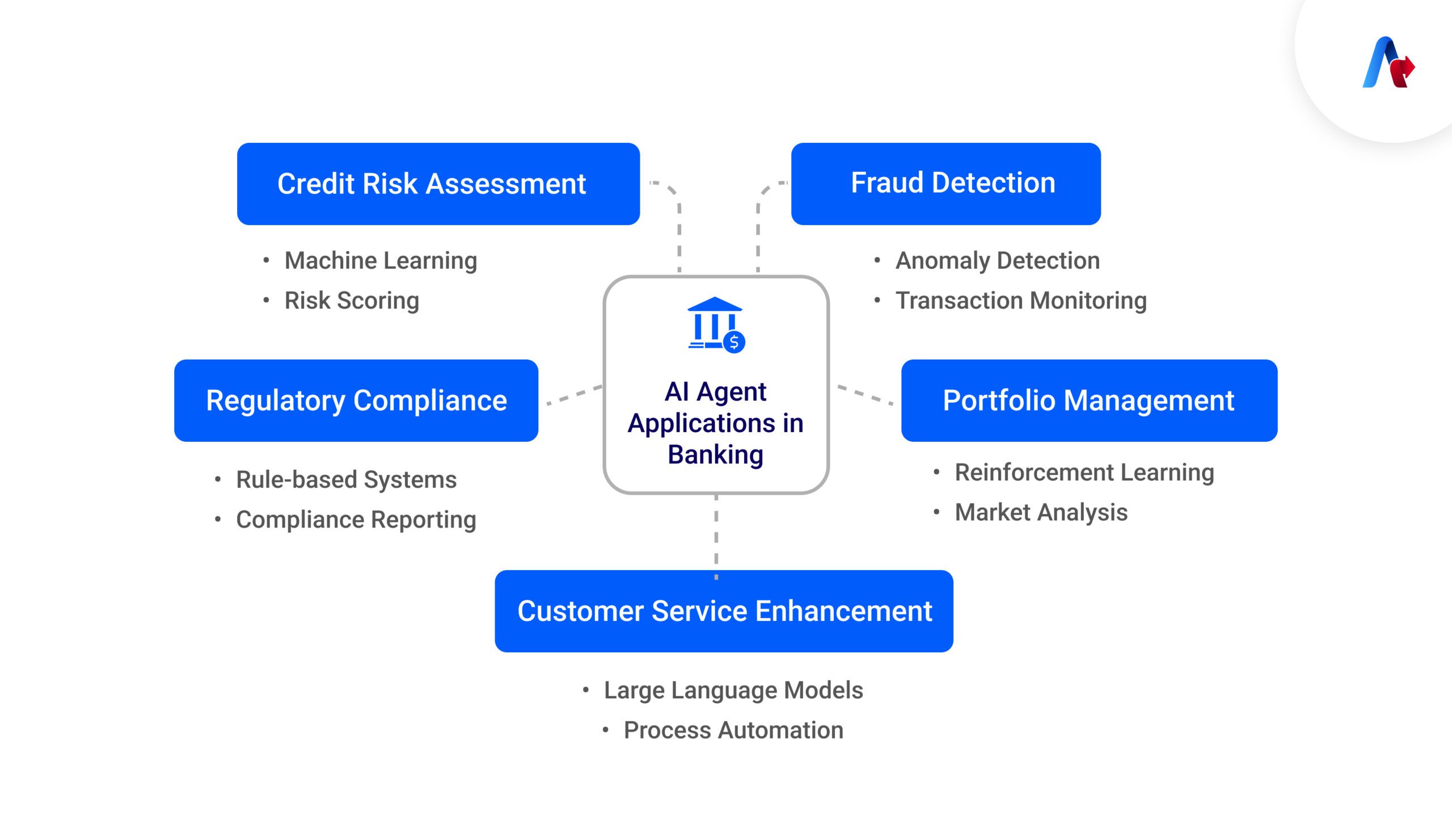
The figure above shows various AI agent applications in the banking sector that make banking operations easy and quick.
15. Financial Market Analysis
Finance AI agents autonomously track movements and do real-time sentiment analysis by monitoring social media, news feeds, and market patterns to spot changes in investor sentiment or new threats. These agents can create trade suggestions or carry out transactions automatically by analyzing this data in conjunction with past trends and preset trading methods.
For optimal portfolio performance, this enables quicker, data-driven decision-making, lessens emotional bias, and enables investors or institutions to react quickly to shifting market conditions.
16. Insurance Claim Processing
AI agents simplify the insurance claims process by automatically examining submissions, utilizing computer vision to analyze supporting documentation, including photos of damage and determining the magnitude of the loss. By comparing claim data with policy terms and historical data, they verify policy details to guarantee coverage eligibility, identify any fraud and reduce the cost.
According to this evaluation, AI agents can suggest suitable reimbursements or even start them right away for simple cases, cutting down on processing time, increasing accuracy, and improving customer happiness.
After understanding the financial cases, it’s time for us to know how AI agents are helping in the legal and compliance areas.
Legal & Compliance Automation with AI Agents
Legal and law matters are complex due to manual work and workload. With artificial intelligence, AI agents can perform many of these tasks if executed strategically, so your legal firm can reduce the need for human intervention in many tasks. Some of the major automation use cases include:
17. Contract Review and Navigation
AI agent’s use cases can be seen in legal documentation. These agents review legal documents, identify potential issues, and suggest any necessary clause modifications to expedite negotiations. With natural language processing and machine learning, AI agents analyze huge amounts of legal text to detect problematic language and highlight key terms that may require revision.
It not only speeds up the review process but also reduces the chances of human oversight, enabling legal teams to focus more on strategic decisions.
18. Document Summarization and Drafting
By automatically reducing lengthy reports, legal documents, or research papers into manageable, easily readable formats, AI agents simplify documentation responsibilities.
Additionally, by collecting important information and organizing it in accordance with predetermined forms or legal criteria, they can produce a variety of content, including internal reports, policy changes, and compliance documents.
Employees' manual labor comes down, documentation procedures go up, and official communications are more accurate and consistent as a result.
Real estate businesses, especially property owners, are now moving towards automation to make their work effective. Below, you will learn about AI use cases in real estate.
19. Regulatory Monitoring and Risk Alert
By using AI agents in regulatory monitoring and alert, you can avoid legal issues and fines from the government and agencies. As a legal firm, following these rules can improve the trust with your clients and the public.
With the intervention of automation, it can analyze and monitor the changes happening in the area and update a specific task without much intervention. AI goes into diverse part, such as news, regulatory databases, and an internal system for letting you know the changes.
Smart AI agents will not just react to the issues, but they update and predict potential problems in advance to save you from the fine and keep on updating whenever changes happen in the laws.
Artificial Intelligent Agent for Real Estate
Several complex tasks are part of agentic AI for real estate, where it can independently pursue the assigned goal and reduce human intervention compared to RPA. Implementing AI Ally is not about replacing real agents; instead, it reduces the burden and provides real-time insights for better decision-making.
20. Real Estate Property Matchmaking
By automatically connecting customers with houses that fit their preferences—such as location, price range, and amenities—AI agents can streamline the home-buying process. Following the discovery of a match, the AI can automatically arrange property visits according to availability and even help with filling out and arranging the required documentation.
With special recommendations throughout the process, this support not only saves time but also improves the entire experience for all parties.
One popular AI agent example in the real estate sector is Trulia. The company provides personalized property recommendations to enhance the home search experience for its users.
21. Smart Lease Management
Leasing a property is part of the real estate industry, but there are jobs such as compliance and documentation. Assigning a smart intelligent agent can help you with independent decision making, increase tenant’s experience, follow rules and even interact with them if necessary.
They are not just limited to these activities. AI can check the real-time market price to improve revenue while remaining competitive in the market. Tenants get 24-hour service where they can submit requests, make payments, and more.
In stores and online, agents predict demand, engage customers and provide more services. Find out how they work efficiently and cut costs in this sector with these use cases.
What’s your next move? Make it smarter with Agentic AI.
Our Agentic AI experts can helpAgentic AI Use Cases in Retail
While thinking about smart agents in the retail sector, you find plenty of areas that can be automated, from inventory to personalized experience. The AI intervention is vital as it streamlines the supply chain and minimizes human intervention. The following are some of the key use cases outlined below.
22. Retail Inventory Optimization
AI agents are very productive in inventory optimization. It assists the retail sector in forecasting demand using sales data, seasonal trends, and external factors like market shifts. These intelligent AI agents can identify purchasing patterns to predict future stock requirements with high precision to help businesses avoid overstocking and stockouts.
With AI in hand, companies can ensure product availability and improve customer satisfaction. AI agents also automate the inventory management process and alter your inventory in real-time, triggering reorders when supplies fall low.
23. Dynamic Pricing & Promotions
AI in the retail sector excels in pricing and promotion strategies based on the real-time demand, consumer behaviour and competition. It is crucial in areas where prices are constantly changing, and any business can utilize AI to promote products according to the trend.
Smart agents are strategically vital for any business that needs to satisfy its clients, boost sales and improve profit by providing a competitive price that is present in the market.
Case Study: How Accelirate automation and process discovery saved $ 1 million for a famous American retail chain
24. Personalized Shopping Experience
The taste and preference of each person are different in this world. What is preferred by one is not a good choice for the other person. In this scenario, the retail sector can use this automation sector to provide a customized experience for each of its clients.
Agents will go through the history of the customer, predict intent, and behavior to give the best-suited product. It provides personal recommendations, discounts, or even tailors emails to each person.
A shop can use this technology to do the entire process from shopping to checkouts. For example, agentic AI checks customers' queries and understands the demand with the assistance of NLP and ranks better in search results.
Agents can automate several activities in the logistics and supply chain and reduce human intervention that requires critical thinking. Are you ready to learn some use cases?
Use Cases in Logistics & Supply Chain
While you check the agentic AI use cases in the supply chain, there are several areas that you find worthy. It demonstrates its excellence in inventory management, demand forecasting, predicting maintenance issues, and automating other daily warehouse activities to improve productivity and profitability.
25. Logistics Route Planning
After evaluating traffic, weather, delivery priorities, and truck capacity, AI agents improve logistics routes and reduce your overall costs. These agents contribute to decreased fuel consumption, cheaper operating costs, and faster, more dependable deliveries by continuously modifying routes in response to shifting conditions.
The studies show that the global AI in the supply chain market is projected to reach $157.6 billion by 2033.
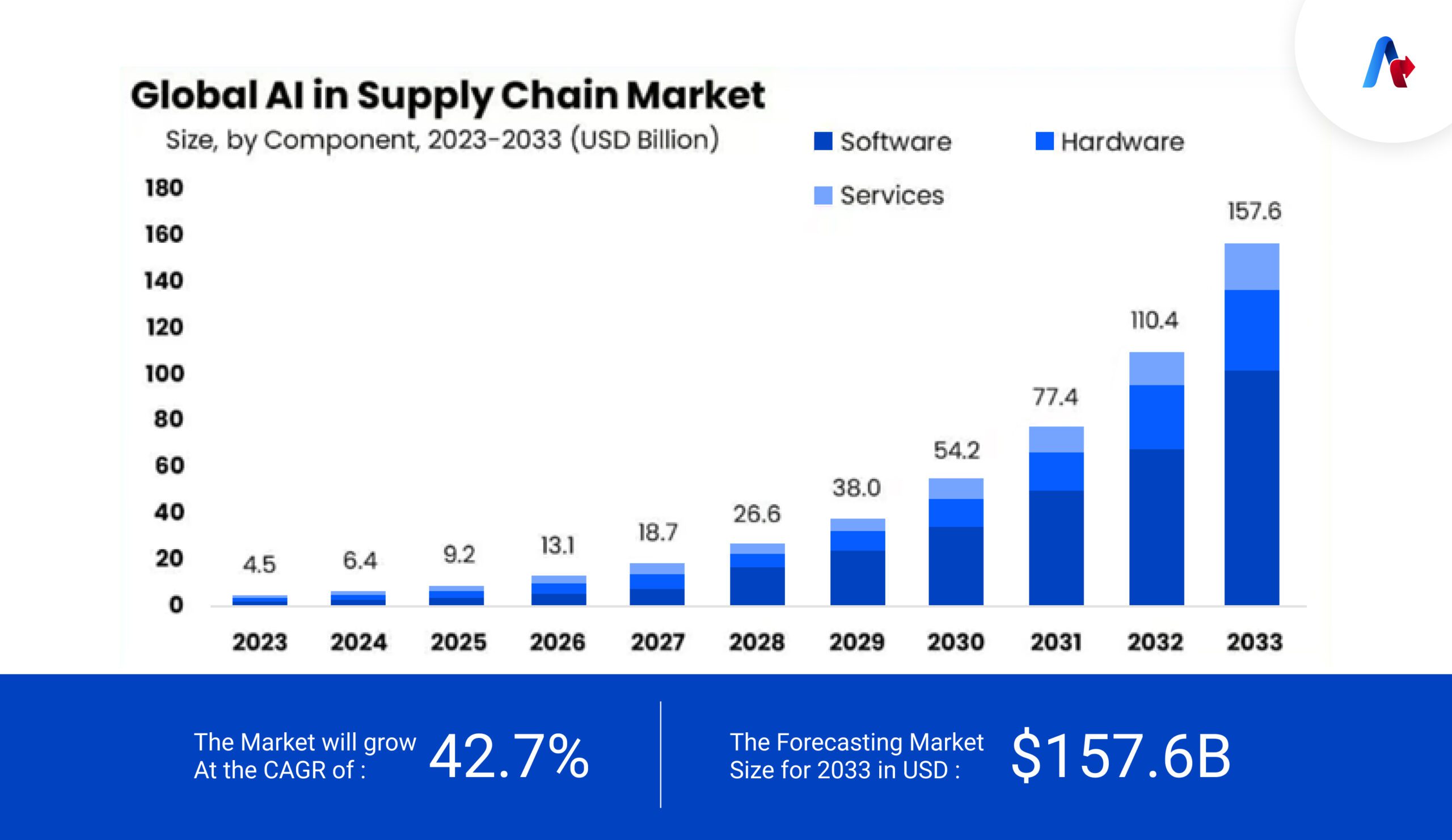
Through on-time and consistent delivery, this degree of optimization not only increases supply chain efficiency but also enhances customer satisfaction.
26. Supply Chain Risk Mitigation
By using AI agents, the supply chain can monitor world events like pandemics, political unrest, and economic shifts to assist companies in proactively managing supply chain risks. In order to evaluate possible dangers, these agents use NLP and predictive analytics to compile information from news feeds, social media, and government news.
It further predicts disruptions before they happen by comprehending the larger global environment, which enables businesses to create backup plans before head.
27. Automated Order Fulfillment
Fulfilling the order on time is part of the supply chain business as it impacts customer satisfaction the most. AI agents' involvement in this area is useful for timely delivery and enhances customer satisfaction.
Some of the use cases identified are:
- Inventory check to fulfil the order when necessary.
- Intervention and coordination with supply shipping carriers to ensure timely delivery.
- Independent order confirmation and provide accurate details on the delivery to the customers.
In factories, agentic AI helps keep your machine running by predicting maintenance in advance and improving safety.
Agentic AI Manufacturing & Industrial AI
Manufacturing is a vital area where automation can minimize production costs by identifying repairs and problems in advance. A traditional industry can change into a smart one by using AI, so it can improve its productivity and efficiency.
Some of the agentic AI applications in manufacturing are:
28. Manufacturing Quality Control
AI agents use sensor data and computer vision to continuously scan production lines for flaws, irregularities, or inefficiencies in manufacturing quality control. These agents can accurately identify problems like surface imperfections, misalignments, or departures from specifications by examining photos and real-time information from machinery.
Once located, they can automatically change machine settings, remove faulty parts, or set off alerts, all of which contribute to consistent product quality, waste reduction, and increased operational effectiveness.
A manufacturing company, Siemens, has integrated AI into its manufacturing processes to monitor production lines in real-time, predict equipment failure, and ensure product quality.
29. Cybersecurity Threat Response
When consistent monitoring of network traffic and odd trends are observed, eventually these define a possible threat, aiding AI agents to improve the overall security of a network. They could easily reveal such odd online behaviour's related to hackers, illegal access attempts, or those that potentially indicate an exfiltration event through machine learning and behavioral analysis.
With immediate threat identification, the AI would also quickly initiate countermeasures, such as blocking fraudulently acquired IPs, isolating disgruntled parts, or calling for security to inform them of the intrusion.
This obviously also minimizes the damage done and therefore is able to restrict the incident badly. Therefore, this has also increased an organization's speed in responding to its cyber threats with utmost efficiency.
Darktrace is a leading cybersecurity company focusing on the use of Artificial Intelligence to counter advanced cyber threats. It enables the detection of any anomalies and threats in real time.
30. Predictive Maintenance
An autonomous AI in the manufacturing sector is effective because it continuously checks equipment and predicts failures in advance. It allows your industry to schedule maintenance out of the peak hours.
This is how AI automation works in the manufacturing sector:
- The artificial intelligence agent you use in contact with sensors, IoT devices, and other vital equipment to check the health. This approach minimizes your equipment downtime and looks for alternatives without affecting the whole production.
- The AI will schedule the maintenance when it is convenient, trigger alerts for human intervention and reduce the time for monitoring so you can utilize the people for other vital tasks.
AI and automation assist maintain business workflow by helping with compliance and other complicated tasks. Let's explore some uses that help you understand the functions of agents.
Agentic AI for Enterprise Workflows and Integration
With the help of a large language model (LLM), agents can change a lot in workflow and integration. AI smart agents act autonomously, solve multiple multi-tasks and complex work and drive to end-to-end solutions.
31. Procurement Workflow Automation
AI agents streamline every stage of the procurement process, from request to payment, to guarantee efficiency and policy compliance by using automation. AI agents begin by validating demands, choosing approved vendors, and initiating purchase requisitions based on predetermined budgets and criteria.
They can estimate demand to avoid overordering or stockouts and use historical procurement data to provide affordable alternatives. These agents cut down on manual involvement and delays by managing approvals, creating purchase orders, and monitoring order status in real time.
32. Energy Usage Optimization
By observing consumption patterns across systems such as HVAC, lights, and machines, AI agents optimize energy usage by identifying inefficiencies and potential savings areas.
Intelligent AI work includes modifying settings, such as lowering lights during periods of low occupancy or adjusting temperature controls according to usage patterns and weather forecasts by evaluating previous trends and real-time data.
In addition to lowering energy waste and operating expenses, this clever automation promotes sustainability objectives by lowering the total environmental effect of the building or business.
33. Virtual R&D Assistants
AI-powered virtual R&D assistants save researchers a great deal of time by finding pertinent academic papers, patents, and technical documents from large databases, which helps expedite innovation. These agents are able to evaluate results, spot knowledge gaps, and even come up with new theories based on patterns in the data.
By mimicking research or product tests, some sophisticated systems go one step further and enable teams to examine results prior to actual trials. This assistance lowers the overall cost and effort in research and development procedures, improves decision-making, and expedites discovery cycles.
Agentic AI in education is increasing as it can offer customized learning and content. Explore them in the next section.
What’s your use case? We have the right solution.
Get a free consultationAgentic AI in Education & Knowledge Management
The revolution of agentic AI in education is changing this sector, especially in how children acquire knowledge. Many big institutions use agents to engage students and perform administrative tasks. The following section will explain the agentic AI use cases in education and knowledge management.
34. Personalized Learning in EdTech
Individual learning experience is prioritized here by modified content, learning style, and strengths. To ensure more efficient and interesting learning outcomes, they continuously evaluate performance data and modify lessons in real time.
Now, as per a report by Salesforce, more than 7 in 10 college students and administrators use AI agents to ease burnout.
One popular agentic AI use case in the education sector is Duolingo. A smart bot is integrated into the language-learning program Duolingo to communicate with users and offer tailored exercises and feedback.
35. Training & Knowledge Delivery
Delivering results with automation is improving in the education sector. The main advantage of this system is that it adapts to the learners' needs and provides specialized content and recommendations to the students.
Each person is unique, so they need a personalized lesson to meet their requirements. An educational agent can recommend the resources and learning path, each different for the student.
When needed, agents can adjust the content delivery and offer real-time engagement to the learners. It also gives on-the-spot feedback and supports the learner with the proper knowledge and materials.
How Can Enterprises Tackle the Transparency and Explainability Challenges of Agentic AI?
Transparency and explainability issues are common for businesses using agentic AI, particularly when AI agents make decisions on their own. Building trust, maintaining compliance, and coordinating results with corporate objectives all depend on addressing these issues. Organizations can increase the interpretability and accountability of agentic AI by putting the appropriate tactics into practice.
- Put Explainable AI (XAI) Frameworks into Practice: Make use of models and tools made to clearly explain the reasons behind AI judgments.
- Preserve Audit Trails: Make certain that agentic AI operations are recorded and traceable for evaluation and compliance.
- Human-in-the-Loop Oversight: Establish checkpoints where human specialists can examine or confirm results produced by AI.
- Employ Transparent Algorithms: For high-stakes applications, choose interpretable models or hybrids over intricate black-box solutions.
- Test for Accuracy and Bias Frequently: Keep an eye on AI behavior to identify and fix any inadvertent biases or mistakes.
How Can Accelirate Speed Up Your Business with Agentic Automation?
By implementing intelligent AI agents that can function autonomously, adjust to shifting conditions, and make context-aware decisions, Accelirate assists companies in realizing the full potential of agentic automation.
With our extensive knowledge of Agentic AI integration, process automation, and enterprise-grade scalability, we help businesses improve customer experiences, decrease human labor, and streamline operations.
Get tailored solutions that speed up your digital transformation and produce quantifiable business results. Connect with our AI agent experts today.


